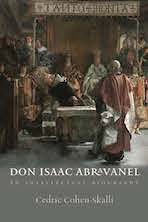Don Isaac Abravanel: An Intellectual Biography

Cedric Cohen-Skalli
One of the greatest leaders and thinkers of Iberian Jewry in the aftermath of the expulsion of 1492
Don Isaac Abravanel (1437–1508) was one of the great inventors of Jewish modernity. A merchant, banker, and court financier, a scholar versed in both Jewish and Christian writings, a preacher and exegete, a prominent political actor in royal entourages and Jewish communities, Abravanel was one of the greatest leaders and thinkers of Iberian Jewry in the aftermath of the expulsion of 1492. This book, the first new intellectual biography of Abravanel in twenty years, depicts his life in three cultural milieus—Portugal, Castile, and post-expulsion Italy—and analyzes his major literary accomplishments in each period. Abravanel was a traditionalist with innovative ideas, a man with one foot in the Middle Ages and the other in the Renaissance. An erudite scholar, author of a monumental exegetical opus that is still studied today, and an avid book collector, he was a transitional figure, defined by an age of contradictions. Yet, it is these very contradictions that make him such an important personality for understanding the dawn of Jewish modernity.
"This vibrant portrait of Isaac Abravanel departs from earlier biographies to locate him clearly in his own times and on his own terms: learned, eclectic, and deeply shaped by the Iberian expulsions and Italian sojourns. Adapting traditions to his times and position, he is pragmatic, paradoxical, and above all fully human." — Nicholas Terpstra, University of Toronto, author of Religious Refugees in the Early Modern World
"Cohen-Skalli’s study is an erudite and penetrating contribution to our understanding of one of the most original figures in Jewish history and thought." — Moshe Idel, Emeritus Professor, The Hebrew University
"Cohen-Skalli’s elegant and comprehensive book about Isaac Abravanel — one of the most fascinating Jewish philosophers, exegetes, and political operatives in any period— represents a rare achievement: a work of history that is accessible to a broad audience yet does not sacrifice scholarly integrity. Highly recommended to anyone interested in Jewish thought of the Middle Ages and Early Modern period; the role of Jews in European politics; and the epochal story of the Sephardi diaspora." — Andrew Berns, University of South Carolina
Purchase from Brandeis University Press
About the Author
Cedric Cohen-Skalli teaches early modern and modern Jewish philosophy at the University of Haifa, Israel, and is the director of the Bucerius Institute for the Research of Contemporary German History and Society.